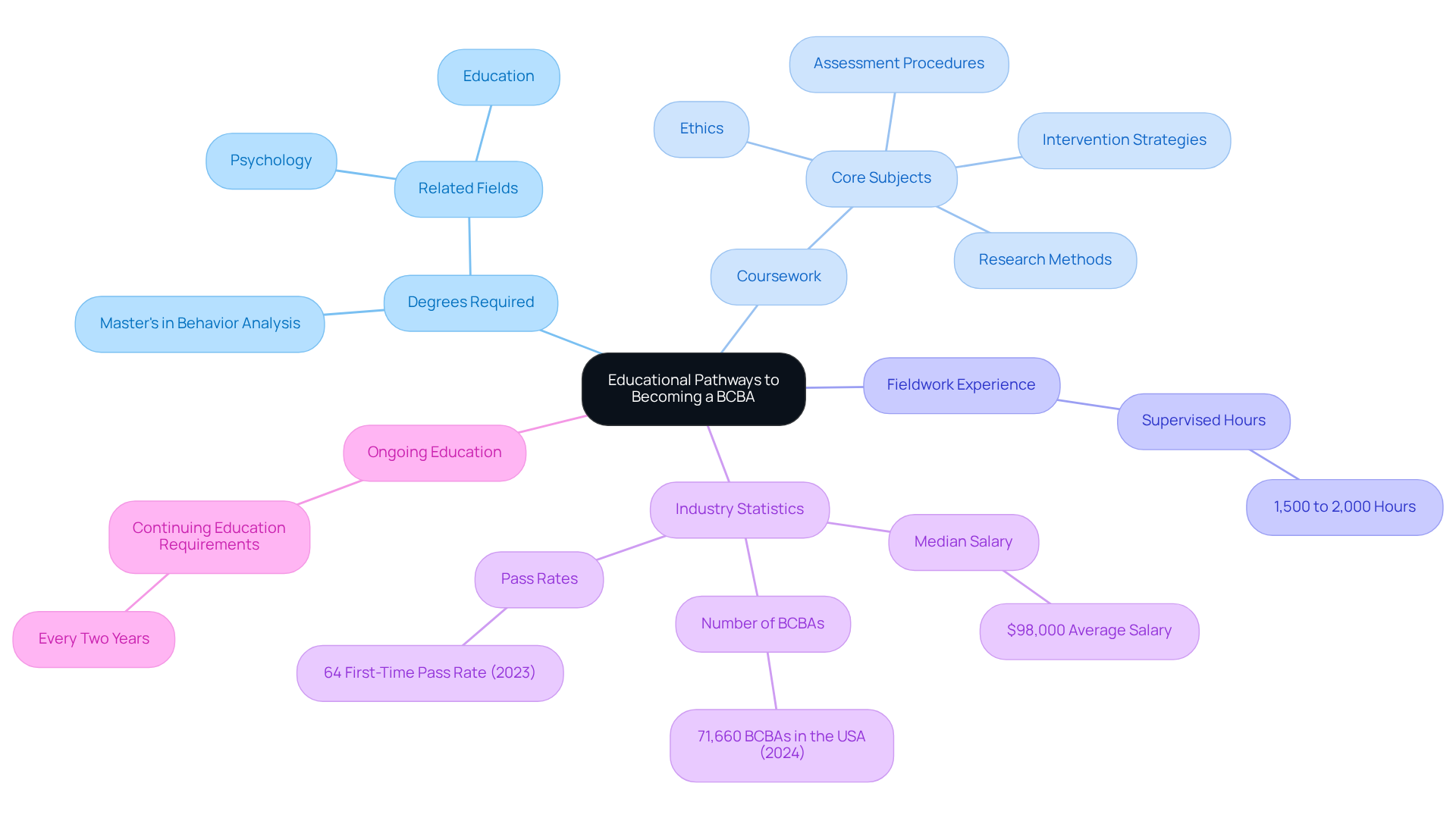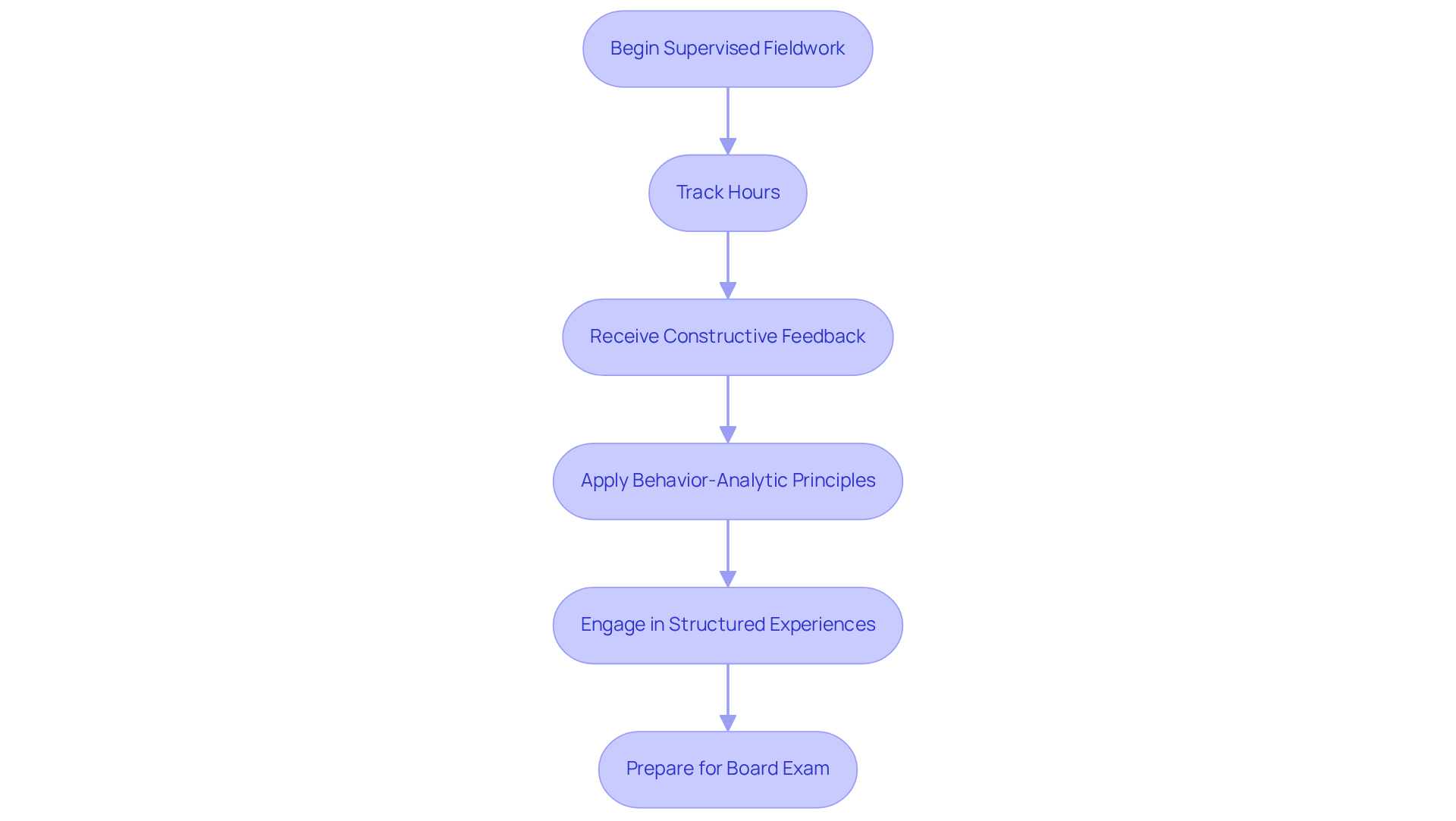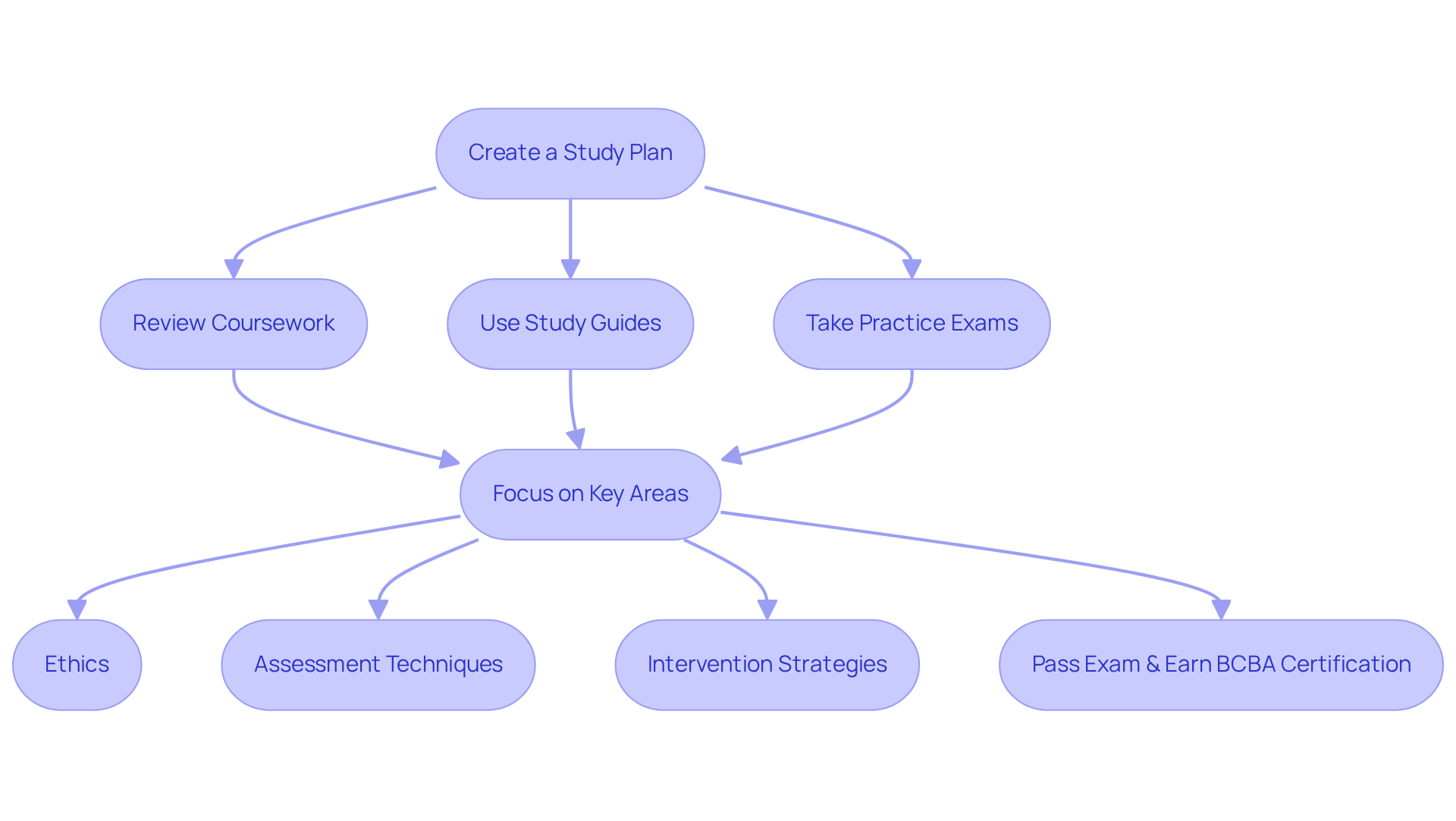To become a Board Certified Behavior Analyst (BCBA), you'll typically need a master's degree in behavior analysis, psychology, or a related field. This degree must include specific coursework and supervised fieldwork. Accredited programs are particularly important because they provide the essential training and practical experience you need. This foundation is crucial for passing the certification exam and effectively supporting individuals facing behavioral challenges.
Let’s explore this together! By understanding these requirements, you can feel more prepared on your journey. Remember, you’re not alone—many parents share similar experiences, and there are resources available to help you every step of the way!
In a world where the demand for Board Certified Behavior Analysts (BCBAs) is really taking off, understanding the educational pathways to certification is more important than ever! These dedicated professionals play a crucial role in transforming the lives of individuals facing behavioral challenges, especially within the autism spectrum.
In this article, we’ll explore the specific degrees and coursework needed for aspiring BCBAs, shining a light on the essential qualifications to navigate this rewarding career.
As the landscape of autism care evolves, what challenges do future BCBAs face in obtaining the necessary credentials to meet the growing demand for their expertise? Let’s dive in together!
A Board Certified Behavior Analyst (BCBA) is a highly trained expert who has completed stringent educational and experiential criteria, leading to the inquiry of what degree does a BCBA need to offer analysis services. Behavior analysts play a vital role in assessing, analyzing, and developing tailored interventions for individuals facing behavioral challenges, especially those on the autism spectrum. By using the principles of Applied Behavior Analysis (ABA), they create personalized treatment plans that promote positive changes and skill enhancement, helping children gain independence through essential skill growth. Did you know that as of 2023, the demand for board-certified behavior analysts has skyrocketed? There are over 65,000 job postings out there requiring or preferring such credentials, highlighting the critical role these professionals play in autism care.
The BCBA credential not only signifies a high level of expertise but also a commitment to ethical practice within the field of behavior analysis. This qualification is essential for ensuring that practitioners are equipped with the necessary skills to provide effective autism care. Board Certified Behavior Analysts design and implement intervention programs, train staff and caregivers, and continuously monitor progress to adapt strategies as needed. Their work is crucial in enhancing the quality of life for children with autism, as they use evidence-based techniques that boast an impressive success rate—over 89%—in improving communication skills, social interactions, and overall development.
At Rori Care, our world-class clinicians are here to support families through comprehensive and compassionate ABA treatment. We emphasize the importance of caregiver education in child development. By integrating cutting-edge AI technologies, Rori Care boosts the efficiency of ABA therapy, allowing clinicians to generate automatic progress reports and freeing up 50% more time for direct child treatment. Experts highlight the importance of understanding what degree does a BCBA need for certification in autism care, noting that it equips professionals with the tools to meet each child's unique needs. As the prevalence of autism continues to rise, behavior analysts are becoming increasingly essential in providing effective, personalized support to families navigating the complexities of autism treatment.
And here’s something to consider: the anticipated job growth rate of 22% for Board Certified Behavior Analysts over the next decade emphasizes the rising demand for these professionals, making it a promising career path. With an average salary of around $85,571, the financial incentives also reflect the critical need for qualified BCBAs in the field. Let’s explore this together and see how we can support you every step of the way!
Candidates often wonder what degree does a BCBA need in order to become a Board Certified Behavior Analyst (BCBA), which is typically a master's degree in behavior analysis, psychology, or a related field from an accredited institution. This degree program should include specific coursework in behavior analysis, covering essential topics like ethics, assessment procedures, and intervention strategies. Programs accredited by the Behavior Analyst Certification Board (BACB) are especially valuable, ensuring students receive the rigorous training necessary for certification. For instance, the University of Georgia and McNeese State University offer accredited master's programs that emphasize hands-on training and practical application through their Applied Behavior Analysis Clinics.
As of 2023, there were 71,660 BCBAs in the USA, highlighting a growing demand for qualified professionals in this field. Generally, it takes about 1 to 2 years of full-time study to complete a behavior analyst degree program, which leads to the question of what degree does a BCBA need, depending on course load and prior education. Candidates also need to finish between 1,500 and 2,000 hours of supervised fieldwork, which is crucial for gaining practical experience.
Starting in 2025, several new educational programs are emerging, focusing on applied behavior analysis and preparing students for the certification exam. The increasing number of accredited master's programs in behavior analysis reflects the profession's growth, with the number of newly certified Board Certified Behavior Analysts rising from 5,000 in 2019 to 6,948 in 2023. This upward trend emphasizes the importance of choosing a program that meets BACB accreditation standards and aligns with your career goals and learning preferences. Additionally, it's good to know that the median GRE score for applicants accepted into BCBA programs is 302, and the average yearly salary for board-certified behavior analysts is around $98,000. Ongoing continuing education is also essential to maintain qualifications, ensuring that BCBAs stay updated with industry standards.
Beyond formal education, empowering caregivers with ABA principles and strategies is vital for supporting children's behavioral goals. Educating caregivers enhances support, informed decision-making, and improved behavioral outcomes, ultimately leading to more effective and lasting improvements in children's behavior. Plus, passing the board exam for RBT credentialing assesses proficiency in the RBT Task List, ensuring candidates are well-prepared to function as competent Registered Behavior Technicians. The integration of AI-driven progress report automation in ABA therapy also boosts efficiency, freeing up 50% more time for child treatment, which can significantly benefit both practitioners and families. Let’s explore this together!

To become a certified behavior analyst, candidates need to complete between 1,500 and 2,000 hours of supervised fieldwork, depending on their chosen pathway. This hands-on experience is guided by a qualified behavior analyst and involves applying behavior-analytic principles in real-life situations. It's important for applicants to carefully track their hours and seek constructive feedback on their performance—this is key to honing the skills needed for crafting and implementing effective intervention plans.
Engaging in this fieldwork not only deepens their understanding of Applied Behavior Analysis (ABA) but also prepares them for the challenges they’ll face in their careers. Did you know that candidates who participate in structured fieldwork experiences have a much higher success rate on the board exam? This highlights just how crucial practical experience is in shaping skilled analysts.
Experienced BCBAs often say that the knowledge gained during supervised fieldwork is invaluable, fostering both professional growth and confidence in using analysis techniques. Plus, empowering caregivers with ABA principles and strategies boosts their ability to support children's behavioral goals. This leads to better behavioral outcomes and informed decision-making, ultimately benefiting child development. Let’s explore this together and see how these experiences can make a difference!

The behavior analyst examination is a significant step in your credentialing journey! It consists of 185 multiple-choice questions that assess your understanding of behavior analysis principles and practices. To prepare for this challenging exam, it's essential to create a structured study plan. This should include:
Experts suggest dedicating several months to your preparation, focusing on key areas like:
Research shows that candidates who follow structured study plans significantly boost their chances of success on the exam. Once you pass, you'll earn your BCBA certification, giving you the ability to practice independently and make a meaningful impact in the field of autism care. Let’s explore this journey together!

Becoming a Board Certified Behavior Analyst (BCBA) is a journey filled with both challenges and rewards. It requires a genuine commitment to education and hands-on experience. If you're aspiring to be a BCBA, you'll need to pursue a master’s degree in behavior analysis or a related field, complete rigorous coursework, and engage in substantial supervised fieldwork. This preparation ensures you're well-equipped to meet the unique needs of individuals facing behavioral challenges, especially those on the autism spectrum.
In this article, we've highlighted key insights, including:
With a growing demand for qualified BCBAs and an anticipated job growth rate of 22% over the next decade, the significance of this role in autism care is immense. The financial rewards, combined with the profound impact on children's lives, make this a compelling career choice for those who are passionate about making a difference.
As the field of behavior analysis evolves, it's crucial for aspiring BCBAs to stay informed about the latest educational pathways and certification requirements. By investing in the right education and gaining practical experience, future BCBAs can enhance their professional prospects and contribute meaningfully to the well-being of countless individuals and families navigating the complexities of autism treatment. Embracing this journey can lead to a fulfilling career dedicated to fostering positive change and empowerment in the lives of others. Let’s explore this together and make a difference!
What is a Board Certified Behavior Analyst (BCBA)?
A BCBA is a highly trained expert who has completed rigorous educational and experiential criteria, specializing in assessing, analyzing, and developing interventions for individuals facing behavioral challenges, particularly those on the autism spectrum.
What role does a BCBA play in autism care?
BCBAs create personalized treatment plans using the principles of Applied Behavior Analysis (ABA) to promote positive changes and skill enhancement, helping children gain independence through essential skill growth.
How has the demand for BCBAs changed recently?
As of 2023, the demand for board-certified behavior analysts has significantly increased, with over 65,000 job postings requiring or preferring BCBA credentials.
What qualifications are necessary for a BCBA?
The BCBA credential signifies a high level of expertise and a commitment to ethical practice, ensuring that practitioners have the necessary skills to provide effective autism care.
What are the responsibilities of a BCBA?
BCBAs design and implement intervention programs, train staff and caregivers, and continuously monitor progress to adapt strategies as needed.
What success rates do evidence-based techniques used by BCBAs have?
Evidence-based techniques used by BCBAs boast an impressive success rate of over 89% in improving communication skills, social interactions, and overall development.
How does Rori Care enhance ABA therapy?
Rori Care integrates cutting-edge AI technologies to boost the efficiency of ABA therapy, allowing clinicians to generate automatic progress reports and freeing up 50% more time for direct child treatment.
What is the anticipated job growth rate for BCBAs over the next decade?
The anticipated job growth rate for Board Certified Behavior Analysts is 22% over the next decade, indicating a rising demand for these professionals.
What is the average salary for a BCBA?
The average salary for a Board Certified Behavior Analyst is around $85,571, reflecting the critical need for qualified BCBAs in the field.